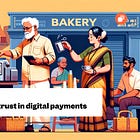Hey there👋,
It's Dharmesh Ba! Thanks for your love towards The India Notes newsletter. I run 1990 Research Labs, a boutique user research consultancy based in Bangalore. We're on the lookout for new projects to start in January 2024. If you'd like to collaborate or know someone who might, drop us a ping. We've worked with top startups like CRED, Plum Insurance, Udaan, Allen Digital, and Jar. Now, let's continue with the story.
When finance gurus discuss the borrowing behavior of Indians, they differentiate between formal and informal sources. Formal sources of borrowing typically refer to money borrowed from financial institutions, including banks and NBFCs. Informal sources, on the other hand, usually involve moneylenders, friends, and family. There's a common belief that one cannot compete with money borrowed from friends and family, as it is often lent at a 0% interest rate. However, I have a contrary point to make on that matter.
A common research technique that I use to uncover someone's priorities is by giving them a set of cue cards and asking them to rearrange them. For example, if I wanted to understand someone's preferred sources of loans, I would show them cue cards labeled with options like banks, NBFCs, money lenders, family, etc., and ask them to arrange these from most preferred to least preferred. In one such exercise in a small tier-4 village, a farmer placed 'family' as his last priority to borrow money from. Intrigued by his choice, I asked for his rationale.
He shared his story of how he was kicked out by his family, forcing him to relocate and start a new life. His goal was to prove to those who had rejected him that he could be successful without their support. Interestingly, he maintained contact with his family and relatives but managed these relationships with caution. In his words, borrowing money from a family member or relative would signal that his life wasn't going well. Yes, the loan might come at 0% interest, but it would cost him his dignity and respect. When money sidesteps as a factor in a household's dynamics, it's dignity and respect that form one's identity.
Many times, borrowing money from friends and family comes with unspoken obligations, such as being available whenever they need help or lending them money when they are in need. In some interviews, men have discussed the idea of not keeping large amounts of liquid cash at home just to avoid the compulsion of having to lend it out if a family member requests it.
While technology can measure tangible aspects of finance, it's these social aspects that often determine decision-making, which we frequently overlook. I mean, tools like Mixpanel or Google Analytics can't capture these emotions.
(Fin)
Comment your views on the topic…
Do you agree with this phenomenon? Share with someone that has come across such a situation❤️
Connect with me on X (twitter)
If you like this article, here are a few more that you might like:







